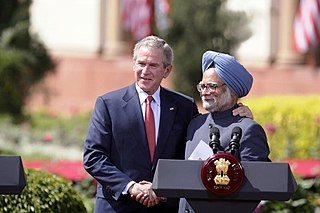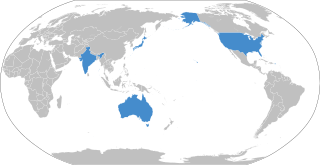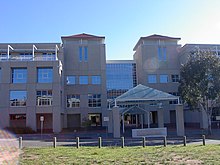
The Treaty on the Non-Proliferation of Nuclear Weapons, commonly known as the Non-Proliferation Treaty or NPT, is an international treaty whose objective is to prevent the spread of nuclear weapons and weapons technology, to promote cooperation in the peaceful uses of nuclear energy, and to further the goal of achieving nuclear disarmament and general and complete disarmament. Between 1965 and 1968, the treaty was negotiated by the Eighteen Nation Committee on Disarmament, a United Nations-sponsored organization based in Geneva, Switzerland.

Eisaku Satō was a Japanese politician who served as Prime Minister of Japan from 1964 to 1972. He is the third-longest serving Prime Minister, and ranks second in longest uninterrupted service as Prime Minister.

The Nuclear Suppliers Group (NSG) is a multilateral export control regime and a group of nuclear supplier countries that seek to prevent nuclear proliferation by controlling the export of materials, equipment and technology that can be used to manufacture nuclear weapons.

Kevin Michael Rudd is an Australian Labor Party politician who was the 26th Prime Minister of Australia, serving twice, from December 2007 to June 2010 and again from June 2013 to September 2013.

Julia Eileen Gillard is an Australian politician who served as the 27th Prime Minister of Australia and Leader of the Labor Party from 2010 to 2013, the first and only woman to date to hold either role. She previously held the roles of Deputy Prime Minister of Australia, Minister for Education, Minister for Employment and Workplace Relations and Minister for Social Inclusion from 2007 to 2010.

Yoriko Kawaguchi is a Japanese politician. Born in Tokyo, she holds a BA in international relations from the University of Tokyo, and an MPhil in economics from Yale University, where she became a member of President's Council on International Activities. Currently, she is a Professor at the Meiji Institute for Global Affairs in Tokyo.

Anthony Norman Albanese is an Australian politician serving as Leader of the Opposition and leader of the Australian Labor Party (ALP) since 2019. He has been Member of Parliament (MP) for Grayndler since 1996. Albanese was Deputy Prime Minister of Australia in 2013 and a Cabinet Minister in the Rudd and Gillard Governments from 2007 to 2013.

Gareth John Evans AC, QC, is an Australian politician, international policymaker, academic and barrister. He represented the Australian Labor Party in the Senate and House of Representatives from 1978 to 1999, serving as a Cabinet Minister in the Hawke and Keating governments from 1983 to 1996 as Attorney-General, Minister for Resources and Energy, Minister for Transport and Communications and most prominently, from 1988 to 1996, as Minister for Foreign Affairs. He was Leader of the Government in the Senate from 1993 to 1996, Deputy Leader of the Opposition from 1996 to 1998, and remains one of the two longest-serving federal Cabinet Ministers in Labor Party history.
The Canberra Commission on the Elimination of Nuclear Weapons was initiated by the Prime Minister of Australia the Honourable Paul Keating in November 1995 to deliberate on issues of nuclear proliferation and how to eliminate the world of nuclear weapons. The result of the commission was published as the Canberra Report in August 1996. The report was presented by Alexander Downer, Australia's Minister of Foreign Affairs, to the United Nations on 30 September 1996 and the Conference on Disarmament on 30 January 1997.

The Department of Foreign Affairs and Trade (DFAT) is the department of the Australian federal government responsible for foreign policy and relations, international aid, consular services and trade and investment.

The Lowy Institute is an independent think tank founded in April 2003 by Frank Lowy to conduct original, policy-relevant research about international political, strategic and economic issues from an Australian perspective. It is based in Sydney, New South Wales, Australia.

The 123 Agreement signed between the United States of America and the Republic of India is known as the U.S.–India Civil Nuclear Agreement or Indo-US nuclear deal. The framework for this agreement was a July 18, 2005, joint statement by then Indian Prime Minister Dr.Manmohan Singh and then U.S. President George W. Bush, under which India agreed to separate its civil and military nuclear facilities and to place all its civil nuclear facilities under International Atomic Energy Agency (IAEA) safeguards and, in exchange, the United States agreed to work toward full civil nuclear cooperation with India. This U.S.-India deal took more than three years to come to fruition as it had to go through several complex stages, including amendment of U.S. domestic law, especially the Atomic Energy Act of 1954, a civil-military nuclear Separation Plan in India, an India-IAEA safeguards (inspections) agreement and the grant of an exemption for India by the Nuclear Suppliers Group, an export-control cartel that had been formed mainly in response to India's first nuclear test in 1974. In its final shape, the deal places under permanent safeguards those nuclear facilities that India has identified as "civil" and permits broad civil nuclear cooperation, while excluding the transfer of "sensitive" equipment and technologies, including civil enrichment and reprocessing items even under IAEA safeguards. On August 18, 2008 the IAEA Board of Governors approved, and on February 2, 2009, India signed an India-specific safeguards agreement with the IAEA. After India brought this agreement into force, inspections began in a phased manner on the 35 civilian nuclear installations India has identified in its Separation Plan. The deal is seen as a watershed in U.S.-India relations and introduces a new aspect to international nonproliferation efforts. On August 1, 2008, the IAEA approved the safeguards agreement with India, after which the United States approached the Nuclear Suppliers Group (NSG) to grant a waiver to India to commence civilian nuclear trade. The 48-nation NSG granted the waiver to India on September 6, 2008 allowing it to access civilian nuclear technology and fuel from other countries. The implementation of this waiver made India the only known country with nuclear weapons which is not a party to the Non-Proliferation Treaty (NPT) but is still allowed to carry out nuclear commerce with the rest of the world.

The prospect of nuclear power in Australia has been a topic of public debate since the 1950s. Australia has never had a nuclear power station. Australia hosts 33% of the world's uranium deposits and is the world's third largest producer of uranium after Kazakhstan and Canada.

Yukiya Amano was a Japanese diplomat and the Director General of the International Atomic Energy Agency (IAEA). Amano previously served as an international civil servant for the United Nations and its subdivisions. On 22 July 2019, IAEA announced that Amano had died.

The Rudd Government (2007–2010) was the executive government of Australia formed by the Australian Labor Party (ALP) and led by Prime Minister Kevin Rudd. The Rudd Government commenced on 3 December 2007, when Rudd was sworn in along with his ministry. This took place just nine days after the defeat of the Howard Government, which was a Coalition of members of the Liberal and National parties, at the 2007 federal election. The Rudd Government concluded on 24 June 2010 when Rudd, under pressure from an impending leadership caucus ballot, stepped down from the leadership of the ALP and was succeeded by his deputy, Julia Gillard. Rudd was re-elected leader of the Labor Party in 2013 and served a second term as prime minister.
The International Luxembourg Forum on Preventing Nuclear Catastrophe — is an international non-governmental organisation uniting leading world-renowned experts on non-proliferation of nuclear weapons, materials and delivery vehicles.

The Gillard Government was the Government of Australia led by the 27th Prime Minister of Australia, Julia Gillard, of the Australian Labor Party. The Gillard Government succeeded the First Rudd Government by way of the Labor Party leadership spill, and began on 24 June 2010, with Gillard sworn in as Prime Minister by the Governor-General of Australia, Quentin Bryce. The Gillard Government ended when Kevin Rudd won back the leadership of the Australian Labor Party on 26 June 2013 and commenced the Second Rudd Government.

The Quadrilateral Security Dialogue is a strategic dialogue between the United States, Japan, Australia and India that is maintained by talks between member countries. The dialogue was initiated in 2007 by the then Prime Minister of Japan Shinzo Abe, with the support of the then Vice President of USA Dick Cheney, the then Prime Minister of Australia John Howard and the then Prime Minister of India Manmohan Singh. The dialogue was paralleled by joint military exercises of an unprecedented scale, titled Exercise Malabar. The diplomatic and military arrangement was widely viewed as a response to increased Chinese economic and military power, and the Chinese government responded to the Quadrilateral dialogue by issuing formal diplomatic protests to its members.
The Humanitarian Initiative is a group of states that evolved within the framework of the Nuclear Non-Proliferation Treaty (NPT) and nuclear weapons diplomacy more widely. 159 states subscribed to the last iteration of the initiative's Joint Statement in 2015. Since 2013, it led to a series of conferences exploring the Humanitarian Impact of Nuclear Weapons, culminating in the Humanitarian Pledge, issued by the Austrian Government, to "fill the legal gap for the prohibition and elimination of nuclear weapons". The Pledge has been endorsed by 108 governments as of 1 June 2015. The Humanitarian Initiative is seen as a direct answer to the lack of progress in nuclear disarmament.
Gordon John de Brouwer was a senior Australian public servant. He was most recently Secretary of the Department of the Environment and Energy from 2016 to 2017.















